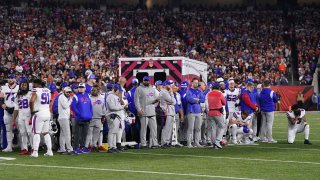
Nearly 72 hours after Buffalo Bills safety Damar Hamlin collapsed on the field at Paycor Stadium, the staff at the University of Cincinnati Medical Center and Buffalo Bills confirmed that the 24-year-old is awake and making “remarkable improvement.”
Among the encouraging updates was a report that Hamlin’s “neurological condition and function” remain intact. He remains intubated to assist with the breathing process, but reportedly is using written communication, with his first message Wednesday night asking who won Monday’s game.
Among the many heroic acts by the medical staff both in the stadium and at the hospital was the fast-acting CPR administered by Bills’ assistant athletic trainer Denny Kellington.
In a press conference on Thursday, Buffalo head coach Sean McDermott called Kellington a “real hero” and praised him for his role in saving Hamlin’s life.
Get Tri-state area news delivered to your inbox. Sign up for NBC New York's News Headlines newsletter.
Sports
Who is Danny Kellington?
Kellington, a native of Midwest City, just outside Oklahoma City, graduated with a bachelor’s degree in health and human performance from Oklahoma State in 2000.
Immediately following graduation, Kellington joined the NFL, spending two years as an athletic training intern with the Denver Broncos and one year as an assistant athletic trainer for the Amsterdam Admirals of the now-defunct NFL Europe.
He returned from Europe after one season to join the training staff at Ohio State in 2002 before eventually landing at Syracuse in 2005. Kellington spent over a decade with the Orange before eventually returning to the NFL via the Bills in 2017.
Kellington is part of a four-person athletic training staff with the Bills.
How did Danny Kellington save Damar Hamlin’s life?
Kellington reportedly gave Hamlin CPR within moments of his collapse on the field. Hamlin received CPR – including defibrillation – for roughly 10 minutes.
Dr. William Knight IV, one of the emergency room physicians featured in a Thursday press conference, said the Bills immediate recognition of a serious issue and fast-acting administration of CPR and defibrillation was critical to the life-saving effort.
“We cannot credit their team enough,” he said.
According to the CDC, roughly 90% of people who suffer a cardiac arrest outside of the hospital do not survive. However, administering CPR within the first few minutes of a cardiac arrest can “double or triple a person’s chance of survival.”



